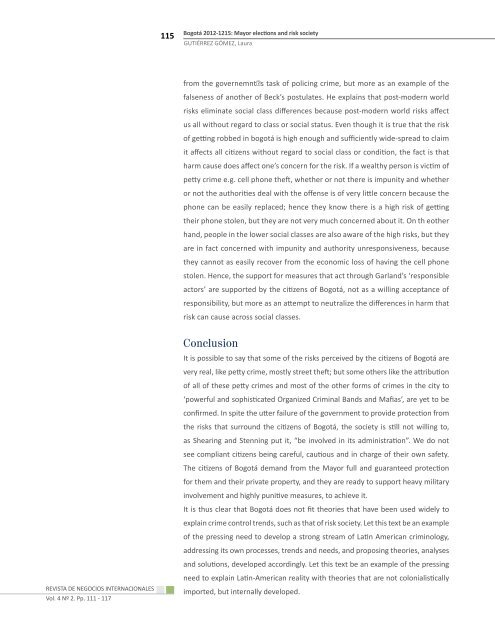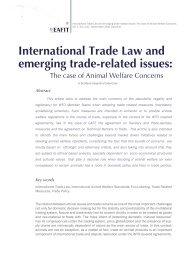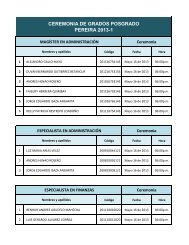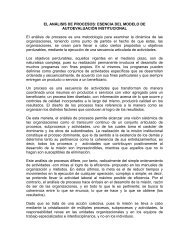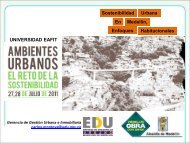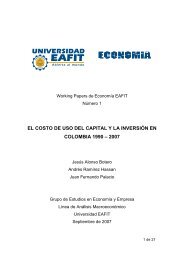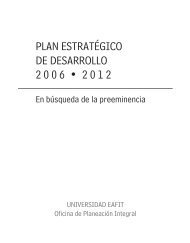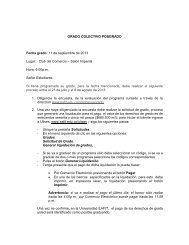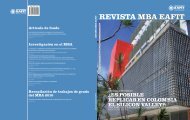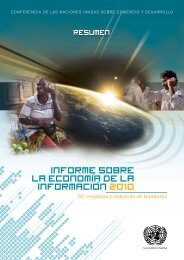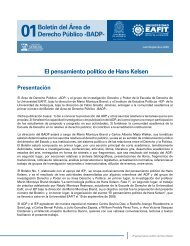Revista de negocios Internacionales Vol 4 Nº 2 - Universidad EAFIT
Revista de negocios Internacionales Vol 4 Nº 2 - Universidad EAFIT
Revista de negocios Internacionales Vol 4 Nº 2 - Universidad EAFIT
Create successful ePaper yourself
Turn your PDF publications into a flip-book with our unique Google optimized e-Paper software.
REVisTA DE NEgOciOs iNTERNAciONAlEs<br />
<strong>Vol</strong>. 4 <strong>Nº</strong> 2. Pp. 111 - 117<br />
Bogotá 2012-1215: Mayor elections and risk society<br />
115<br />
GUTIÉRREZ GÓMEZ, Laura<br />
from the governemnt s task of policing crime, but more as an example of the<br />
falseness of another of Beck’s postulates. He explains that post-mo<strong>de</strong>rn world<br />
risks eliminate social class differences because post-mo<strong>de</strong>rn world risks affect<br />
us all without regard to class or social status. Even though it is true that the risk<br />
of getting robbed in bogotá is high enough and sufficiently wi<strong>de</strong>-spread to claim<br />
it affects all citizens without regard to social class or condition, the fact is that<br />
harm cause does affect one’s concern for the risk. If a wealthy person is victim of<br />
petty crime e.g. cell phone theft, whether or not there is impunity and whether<br />
or not the authorities <strong>de</strong>al with the offense is of very little concern because the<br />
phone can be easily replaced; hence they know there is a high risk of getting<br />
their phone stolen, but they are not very much concerned about it. On th eother<br />
hand, people in the lower social classes are also aware of the high risks, but they<br />
are in fact concerned with impunity and authority unresponsiveness, because<br />
they cannot as easily recover from the economic loss of having the cell phone<br />
stolen. Hence, the support for measures that act through Garland’s ‘responsible<br />
actors’ are supported by the citizens of Bogotá, not as a willing acceptance of<br />
responsibility, but more as an attempt to neutralize the differences in harm that<br />
risk can cause across social classes.<br />
Conclusion<br />
It is possible to say that some of the risks perceived by the citizens of Bogotá are<br />
very real, like petty crime, mostly street theft; but some others like the attribution<br />
of all of these petty crimes and most of the other forms of crimes in the city to<br />
‘powerful and sophisticated Organized Criminal Bands and Mafias’, are yet to be<br />
confirmed. In spite the utter failure of the government to provi<strong>de</strong> protection from<br />
the risks that surround the citizens of Bogotá, the society is still not willing to,<br />
as Shearing and Stenning put it, “be involved in its administration”. We do not<br />
see compliant citizens being careful, cautious and in charge of their own safety.<br />
The citizens of Bogotá <strong>de</strong>mand from the Mayor full and guaranteed protection<br />
for them and their private property, and they are ready to support heavy military<br />
involvement and highly punitive measures, to achieve it.<br />
It is thus clear that Bogotá does not fit theories that have been used wi<strong>de</strong>ly to<br />
explain crime control trends, such as that of risk society. Let this text be an example<br />
of the pressing need to <strong>de</strong>velop a strong stream of Latin American criminology,<br />
addressing its own processes, trends and needs, and proposing theories, analyses<br />
and solutions, <strong>de</strong>veloped accordingly. Let this text be an example of the pressing<br />
need to explain Latin-American reality with theories that are not colonialistically<br />
imported, but internally <strong>de</strong>veloped.


